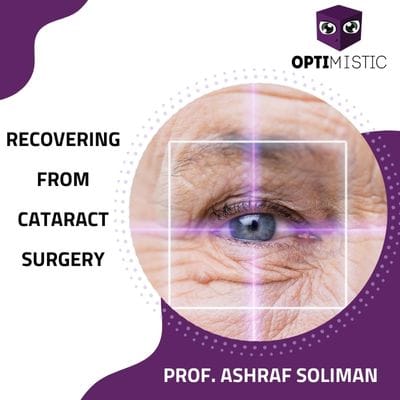Recovering from cataract surgery
What to Expect Recovering from cataract surgery ?
Explore the common side effects and recovering from cataract surgery , potential complications, and benefits of cataract surgery. Learn what to expect during recovery and how to ensure a successful outcome.
Many people undergo cataract surgery, a common procedure to address clouded vision. A cataract develops when the lens in your eye, located behind the iris, becomes cloudy. This cloudiness reduces the amount of light reaching your retina, making it harder to see.

During cataract surgery, the surgeon removes the cataractous lens and replaces it with a clear, artificial lens called an intraocular lens (IOL). This implant replaces the removed lens and has a specific converging power that allows for best visual results, ridding you of your distance glasses. Some models can also replace your reading glasses.
It’s important to remember that all surgeries carry some risk, so your surgeon’s experience and skill are important for the best visual outcomes. People with pre-existing eye conditions or other health problems must be thoroughly examined and diagnosed to prevent these complications.
This article will explore the typical side effects following cataract surgery, along with potential serious complications and how they are treated.
Normal Side Effects After Cataract Surgery
Cataract surgery is a simple common procedure when performed by the best eye surgeon. Although recovery is speedy it’s normal to experience minor temporary side effects as your eye heals. These are usually clear up within a few days without any special treatment. Here’s what to expect:
Blurry Vision
Don’t be surprised if your vision is a bit blurry on the first day. This should improve quickly. It’s important to wait until your vision is completely clear before driving again.
Itchiness
It’s natural for your eye to feel itchy while it heals. Your doctor will prescribe eye drops to soothe the itch. However, if the itchiness disappears then returns days later, or becomes unbearable, call your doctor right away. Itchy eyes can sometimes be a sign of infection.
Inflammation
Some swelling and redness (inflammation) are normal after surgery. Your doctor will prescribe eye drops to manage this. If the inflammation worsens or doesn’t go away, it could indicate an infection that requires immediate medical attention.
Light Sensitivity
It’s common to feel like everyday light is brighter than usual after surgery. This discomfort usually lasts a few days. Some people may need sunglasses until the sensitivity goes away. If the light sensitivity persists, contact your doctor.
Droopy Eyelid (Ptosis)
Your eyelid might droop slightly after surgery. This can be caused by the instruments used during surgery or the anesthesia, but there could be other reasons too. Usually, the droopiness resolves spontaneously within hours. If it doesn’t improve on its own, you must contact your doctor
What to Know About Complications After Cataract Surgery?
Cataract surgery is a very safe procedure with a high success rate. Over 99% of patients have amazing results. However, it’s still important to be aware of potential issues that can arise.
Cloud Cover After Surgery (PCO)
This is the most common after-effect, slightly clouding your vision a few weeks after the surgery. This is a variable complication related to many factors, and is caused by cell build up behind the implanted lens, and a simple laser procedure can clear things up right away.
Infection Threat (Endophthalmitis)
Rare, but serious. Bacteria can sneak in during or after the surgery, causing pain, redness, and vision loss. This is why following your doctor’s instructions and prescriptions after the surgery is important. Early treatment is key, so contact your doctor immediately if you experience any signs of infection.
Bleeding Risk (Retinal Bleeding)
In some patients especially those with diabetes, and on certain blood thinning medications there is slight risk of bleeding in the retina. This can cause vision problems, but is treatable, especially if diagnosed early. Don’t delay seeking help if you experience any vision changes after surgery.
Remember for most cataract patients, phacoemusification surgery successfully restores vision. Complications are rare and treatable. Following your doctor’s post-operative instructions, including using eye drops and attending follow-up appointments, is essential for detecting potential issues like PCO or infection early on.
Rare Complications After Cataract Surgery
While cataract surgery (phacoemulsification) is very safe, it’s important to be aware of some rare complications that can occur. Remember, these happen very infrequently, and doctors are experienced in managing them.
Less Common Risks After Cataract Surgery:
- Detached Retina: Though rare, surgery can cause the light-sensitive layer at the back of your eye (retina) to detach. It is treatable, but early intervention is essential to prevent further complications.
- Bleeding Between Eye Layers: This very uncommon complication involves blood building up in the eye, but it often resolves on its own or with medication.
- High Eye Pressure: Pressure can increase temporarily after surgery, but usually returns to normal. People with existing glaucoma are at higher risk for complications.
Serious But Rare Issues
- Toxic Reaction: Contamination from surgical tools can cause inflammation and vision damage, but is treatable with steroids.
- Lens Fragment Left Behind: A small piece of cataract left behind may require additional surgery to remove. The incidence of this complication is related to your surgeon’s skill and your eye’s pre-operative state.
- Iris Bulging: The colored part of your eye bulging out is very rare due to modern techniques.
- Dislocated Lens Implant: rarely the artificial lens moves out of place, sometimes requiring additional surgery to fix. This happens when you experience trauma after the surgery, and or poor surgical skills
Remember:
These complications are uncommon and advancements have made cataract surgery very safe. Choosing the best ophthalmologist or eye surgeon is essential, and contact your doctor if you have any concerns.
Benefits Outweigh Risks
Cataract surgery is a safe and effective procedure to treat cataracts, a common cause of vision loss.While temporary blurry vision is common after surgery, most people heal well and experience significant improvement in their eyesight and quality of life.
While there are some risks involved, especially for those with other health conditions or older adults, these complications are rare. Careful aftercare and regular checkups with your doctor will help ensure a smooth recovery and optimal results.
Many people hesitate due to surgery anxiety, but cataract surgery is a very common procedure. Doctors are highly skilled at performing it and prepared to manage any complications that may arise.
Untreated cataracts will worsen vision over time. Weighing the benefits against the risks, cataract surgery can significantly improve your quality of life.
Talk to your doctor and people who have had the surgery to address any concerns. The more informed you are, the more confident you’ll feel about having cataract surgery and enjoying better vision.
Best Doctor for Cataract surgery
Dr. Ashraf Hassan Soliman is a consultant for corneal, cataract, refractive eye surgery, and laser vision correction. and glaucoma surgery.
He is One of the best ophthalmologists in Egypt with extensive experience, skill, and knowledge in this field.
FAQs
Q: Who needs cataract surgery?
If cataracts blur your vision enough to hinder daily activities (reading, driving) or prevent examining your eye for other problems, surgery is necessary.
Q: Is blurry vision normal after cataract surgery?
Yes, temporary blurriness is common due to healing. It clears up within a few hours
Q: Why do my eyes feel dry after cataract surgery?
Dry eyes after cataract surgery are common because tiny nerves involved in tear production are temporarily disrupted by the surgery. This usually improves within a few days. Talk to your doctor if dryness persists or bothers you.
Q: Why am I seeing glare, halos, and other weird lights after cataract surgery?
These are called “unwanted visual images” and are quite common after cataract surgery. They have a medical term – “dysphotopsia.” These lights are usually temporary and lessen over time as your eye heals. They can be more noticeable at night or with certain lens implants. If they persist or become bothersome, talk to your doctor to discuss options.

